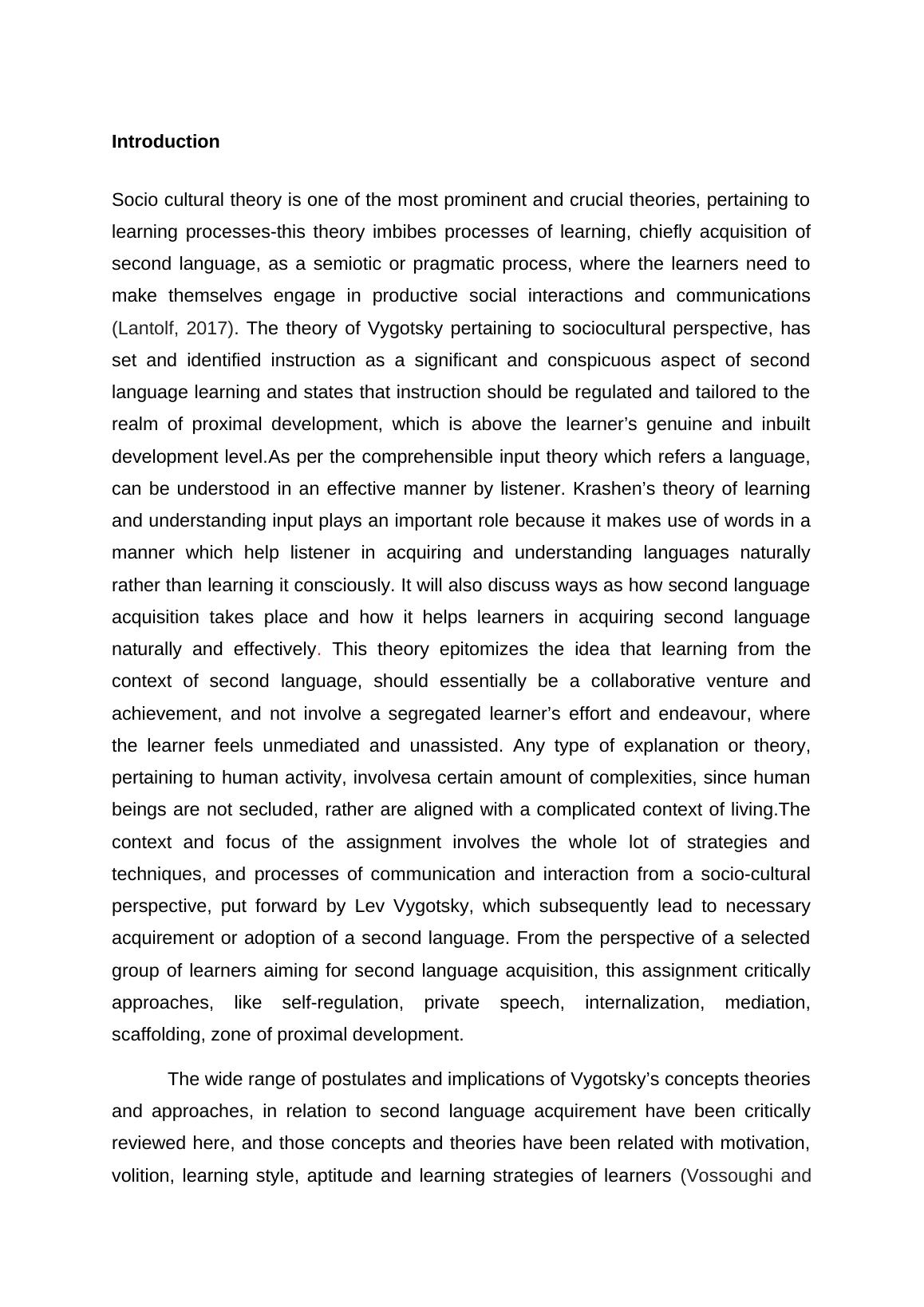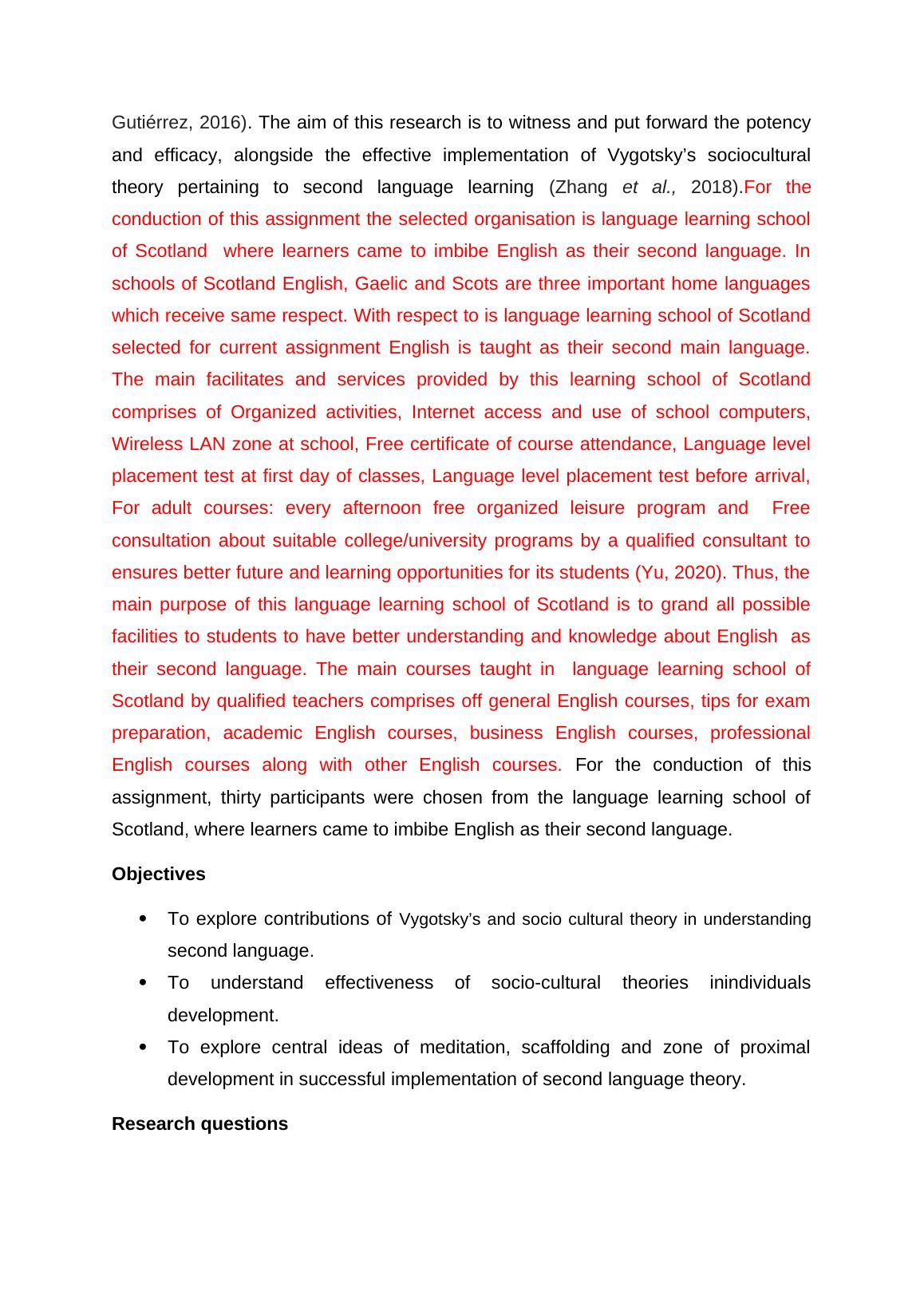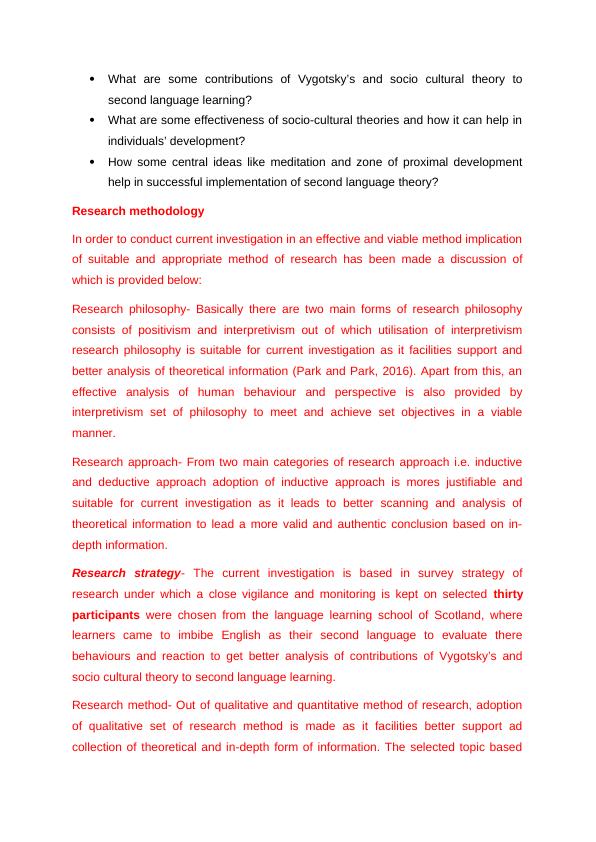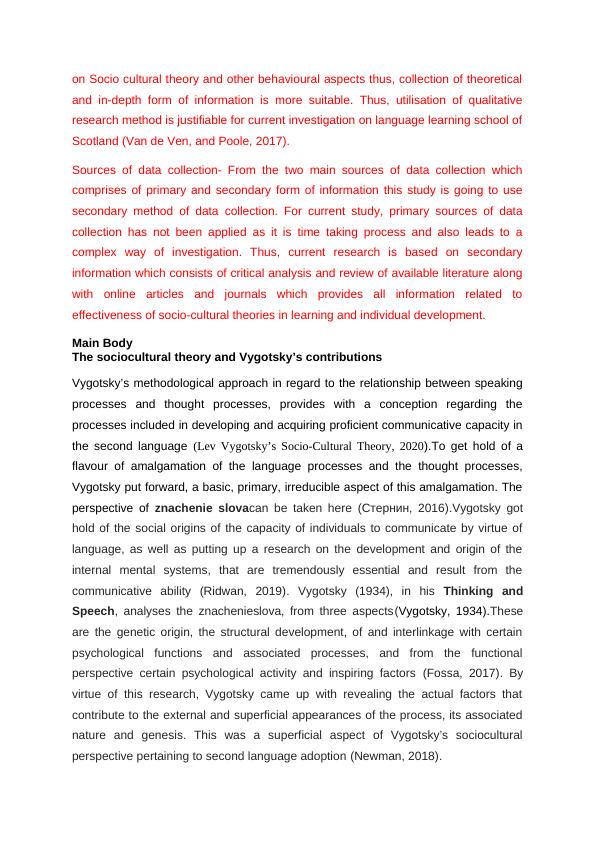Socio Cultural Theory and Second Language Learning
Added on 2023-01-06
17 Pages7017 Words69 Views
Introduction
Socio cultural theory is one of the most prominent and crucial theories, pertaining to
learning processes-this theory imbibes processes of learning, chiefly acquisition of
second language, as a semiotic or pragmatic process, where the learners need to
make themselves engage in productive social interactions and communications
(Lantolf, 2017). The theory of Vygotsky pertaining to sociocultural perspective, has
set and identified instruction as a significant and conspicuous aspect of second
language learning and states that instruction should be regulated and tailored to the
realm of proximal development, which is above the learner’s genuine and inbuilt
development level.As per the comprehensible input theory which refers a language,
can be understood in an effective manner by listener. Krashen’s theory of learning
and understanding input plays an important role because it makes use of words in a
manner which help listener in acquiring and understanding languages naturally
rather than learning it consciously. It will also discuss ways as how second language
acquisition takes place and how it helps learners in acquiring second language
naturally and effectively. This theory epitomizes the idea that learning from the
context of second language, should essentially be a collaborative venture and
achievement, and not involve a segregated learner’s effort and endeavour, where
the learner feels unmediated and unassisted. Any type of explanation or theory,
pertaining to human activity, involvesa certain amount of complexities, since human
beings are not secluded, rather are aligned with a complicated context of living.The
context and focus of the assignment involves the whole lot of strategies and
techniques, and processes of communication and interaction from a socio-cultural
perspective, put forward by Lev Vygotsky, which subsequently lead to necessary
acquirement or adoption of a second language. From the perspective of a selected
group of learners aiming for second language acquisition, this assignment critically
approaches, like self-regulation, private speech, internalization, mediation,
scaffolding, zone of proximal development.
The wide range of postulates and implications of Vygotsky’s concepts theories
and approaches, in relation to second language acquirement have been critically
reviewed here, and those concepts and theories have been related with motivation,
volition, learning style, aptitude and learning strategies of learners (Vossoughi and
Socio cultural theory is one of the most prominent and crucial theories, pertaining to
learning processes-this theory imbibes processes of learning, chiefly acquisition of
second language, as a semiotic or pragmatic process, where the learners need to
make themselves engage in productive social interactions and communications
(Lantolf, 2017). The theory of Vygotsky pertaining to sociocultural perspective, has
set and identified instruction as a significant and conspicuous aspect of second
language learning and states that instruction should be regulated and tailored to the
realm of proximal development, which is above the learner’s genuine and inbuilt
development level.As per the comprehensible input theory which refers a language,
can be understood in an effective manner by listener. Krashen’s theory of learning
and understanding input plays an important role because it makes use of words in a
manner which help listener in acquiring and understanding languages naturally
rather than learning it consciously. It will also discuss ways as how second language
acquisition takes place and how it helps learners in acquiring second language
naturally and effectively. This theory epitomizes the idea that learning from the
context of second language, should essentially be a collaborative venture and
achievement, and not involve a segregated learner’s effort and endeavour, where
the learner feels unmediated and unassisted. Any type of explanation or theory,
pertaining to human activity, involvesa certain amount of complexities, since human
beings are not secluded, rather are aligned with a complicated context of living.The
context and focus of the assignment involves the whole lot of strategies and
techniques, and processes of communication and interaction from a socio-cultural
perspective, put forward by Lev Vygotsky, which subsequently lead to necessary
acquirement or adoption of a second language. From the perspective of a selected
group of learners aiming for second language acquisition, this assignment critically
approaches, like self-regulation, private speech, internalization, mediation,
scaffolding, zone of proximal development.
The wide range of postulates and implications of Vygotsky’s concepts theories
and approaches, in relation to second language acquirement have been critically
reviewed here, and those concepts and theories have been related with motivation,
volition, learning style, aptitude and learning strategies of learners (Vossoughi and

Gutiérrez, 2016). The aim of this research is to witness and put forward the potency
and efficacy, alongside the effective implementation of Vygotsky’s sociocultural
theory pertaining to second language learning (Zhang et al., 2018).For the
conduction of this assignment the selected organisation is language learning school
of Scotland where learners came to imbibe English as their second language. In
schools of Scotland English, Gaelic and Scots are three important home languages
which receive same respect. With respect to is language learning school of Scotland
selected for current assignment English is taught as their second main language.
The main facilitates and services provided by this learning school of Scotland
comprises of Organized activities, Internet access and use of school computers,
Wireless LAN zone at school, Free certificate of course attendance, Language level
placement test at first day of classes, Language level placement test before arrival,
For adult courses: every afternoon free organized leisure program and Free
consultation about suitable college/university programs by a qualified consultant to
ensures better future and learning opportunities for its students (Yu, 2020). Thus, the
main purpose of this language learning school of Scotland is to grand all possible
facilities to students to have better understanding and knowledge about English as
their second language. The main courses taught in language learning school of
Scotland by qualified teachers comprises off general English courses, tips for exam
preparation, academic English courses, business English courses, professional
English courses along with other English courses. For the conduction of this
assignment, thirty participants were chosen from the language learning school of
Scotland, where learners came to imbibe English as their second language.
Objectives
To explore contributions of Vygotsky’s and socio cultural theory in understanding
second language.
To understand effectiveness of socio-cultural theories inindividuals
development.
To explore central ideas of meditation, scaffolding and zone of proximal
development in successful implementation of second language theory.
Research questions
and efficacy, alongside the effective implementation of Vygotsky’s sociocultural
theory pertaining to second language learning (Zhang et al., 2018).For the
conduction of this assignment the selected organisation is language learning school
of Scotland where learners came to imbibe English as their second language. In
schools of Scotland English, Gaelic and Scots are three important home languages
which receive same respect. With respect to is language learning school of Scotland
selected for current assignment English is taught as their second main language.
The main facilitates and services provided by this learning school of Scotland
comprises of Organized activities, Internet access and use of school computers,
Wireless LAN zone at school, Free certificate of course attendance, Language level
placement test at first day of classes, Language level placement test before arrival,
For adult courses: every afternoon free organized leisure program and Free
consultation about suitable college/university programs by a qualified consultant to
ensures better future and learning opportunities for its students (Yu, 2020). Thus, the
main purpose of this language learning school of Scotland is to grand all possible
facilities to students to have better understanding and knowledge about English as
their second language. The main courses taught in language learning school of
Scotland by qualified teachers comprises off general English courses, tips for exam
preparation, academic English courses, business English courses, professional
English courses along with other English courses. For the conduction of this
assignment, thirty participants were chosen from the language learning school of
Scotland, where learners came to imbibe English as their second language.
Objectives
To explore contributions of Vygotsky’s and socio cultural theory in understanding
second language.
To understand effectiveness of socio-cultural theories inindividuals
development.
To explore central ideas of meditation, scaffolding and zone of proximal
development in successful implementation of second language theory.
Research questions

What are some contributions of Vygotsky’s and socio cultural theory to
second language learning?
What are some effectiveness of socio-cultural theories and how it can help in
individuals’ development?
How some central ideas like meditation and zone of proximal development
help in successful implementation of second language theory?
Research methodology
In order to conduct current investigation in an effective and viable method implication
of suitable and appropriate method of research has been made a discussion of
which is provided below:
Research philosophy- Basically there are two main forms of research philosophy
consists of positivism and interpretivism out of which utilisation of interpretivism
research philosophy is suitable for current investigation as it facilities support and
better analysis of theoretical information (Park and Park, 2016). Apart from this, an
effective analysis of human behaviour and perspective is also provided by
interpretivism set of philosophy to meet and achieve set objectives in a viable
manner.
Research approach- From two main categories of research approach i.e. inductive
and deductive approach adoption of inductive approach is mores justifiable and
suitable for current investigation as it leads to better scanning and analysis of
theoretical information to lead a more valid and authentic conclusion based on in-
depth information.
Research strategy- The current investigation is based in survey strategy of
research under which a close vigilance and monitoring is kept on selected thirty
participants were chosen from the language learning school of Scotland, where
learners came to imbibe English as their second language to evaluate there
behaviours and reaction to get better analysis of contributions of Vygotsky’s and
socio cultural theory to second language learning.
Research method- Out of qualitative and quantitative method of research, adoption
of qualitative set of research method is made as it facilities better support ad
collection of theoretical and in-depth form of information. The selected topic based
second language learning?
What are some effectiveness of socio-cultural theories and how it can help in
individuals’ development?
How some central ideas like meditation and zone of proximal development
help in successful implementation of second language theory?
Research methodology
In order to conduct current investigation in an effective and viable method implication
of suitable and appropriate method of research has been made a discussion of
which is provided below:
Research philosophy- Basically there are two main forms of research philosophy
consists of positivism and interpretivism out of which utilisation of interpretivism
research philosophy is suitable for current investigation as it facilities support and
better analysis of theoretical information (Park and Park, 2016). Apart from this, an
effective analysis of human behaviour and perspective is also provided by
interpretivism set of philosophy to meet and achieve set objectives in a viable
manner.
Research approach- From two main categories of research approach i.e. inductive
and deductive approach adoption of inductive approach is mores justifiable and
suitable for current investigation as it leads to better scanning and analysis of
theoretical information to lead a more valid and authentic conclusion based on in-
depth information.
Research strategy- The current investigation is based in survey strategy of
research under which a close vigilance and monitoring is kept on selected thirty
participants were chosen from the language learning school of Scotland, where
learners came to imbibe English as their second language to evaluate there
behaviours and reaction to get better analysis of contributions of Vygotsky’s and
socio cultural theory to second language learning.
Research method- Out of qualitative and quantitative method of research, adoption
of qualitative set of research method is made as it facilities better support ad
collection of theoretical and in-depth form of information. The selected topic based

on Socio cultural theory and other behavioural aspects thus, collection of theoretical
and in-depth form of information is more suitable. Thus, utilisation of qualitative
research method is justifiable for current investigation on language learning school of
Scotland (Van de Ven, and Poole, 2017).
Sources of data collection- From the two main sources of data collection which
comprises of primary and secondary form of information this study is going to use
secondary method of data collection. For current study, primary sources of data
collection has not been applied as it is time taking process and also leads to a
complex way of investigation. Thus, current research is based on secondary
information which consists of critical analysis and review of available literature along
with online articles and journals which provides all information related to
effectiveness of socio-cultural theories in learning and individual development.
Main Body
The sociocultural theory and Vygotsky’s contributions
Vygotsky’s methodological approach in regard to the relationship between speaking
processes and thought processes, provides with a conception regarding the
processes included in developing and acquiring proficient communicative capacity in
the second language (Lev Vygotsky’s Socio-Cultural Theory, 2020).To get hold of a
flavour of amalgamation of the language processes and the thought processes,
Vygotsky put forward, a basic, primary, irreducible aspect of this amalgamation. The
perspective of znachenie slovacan be taken here (Стернин, 2016).Vygotsky got
hold of the social origins of the capacity of individuals to communicate by virtue of
language, as well as putting up a research on the development and origin of the
internal mental systems, that are tremendously essential and result from the
communicative ability (Ridwan, 2019). Vygotsky (1934), in his Thinking and
Speech, analyses the znachenieslova, from three aspects(Vygotsky, 1934).These
are the genetic origin, the structural development, of and interlinkage with certain
psychological functions and associated processes, and from the functional
perspective certain psychological activity and inspiring factors (Fossa, 2017). By
virtue of this research, Vygotsky came up with revealing the actual factors that
contribute to the external and superficial appearances of the process, its associated
nature and genesis. This was a superficial aspect of Vygotsky’s sociocultural
perspective pertaining to second language adoption (Newman, 2018).
and in-depth form of information is more suitable. Thus, utilisation of qualitative
research method is justifiable for current investigation on language learning school of
Scotland (Van de Ven, and Poole, 2017).
Sources of data collection- From the two main sources of data collection which
comprises of primary and secondary form of information this study is going to use
secondary method of data collection. For current study, primary sources of data
collection has not been applied as it is time taking process and also leads to a
complex way of investigation. Thus, current research is based on secondary
information which consists of critical analysis and review of available literature along
with online articles and journals which provides all information related to
effectiveness of socio-cultural theories in learning and individual development.
Main Body
The sociocultural theory and Vygotsky’s contributions
Vygotsky’s methodological approach in regard to the relationship between speaking
processes and thought processes, provides with a conception regarding the
processes included in developing and acquiring proficient communicative capacity in
the second language (Lev Vygotsky’s Socio-Cultural Theory, 2020).To get hold of a
flavour of amalgamation of the language processes and the thought processes,
Vygotsky put forward, a basic, primary, irreducible aspect of this amalgamation. The
perspective of znachenie slovacan be taken here (Стернин, 2016).Vygotsky got
hold of the social origins of the capacity of individuals to communicate by virtue of
language, as well as putting up a research on the development and origin of the
internal mental systems, that are tremendously essential and result from the
communicative ability (Ridwan, 2019). Vygotsky (1934), in his Thinking and
Speech, analyses the znachenieslova, from three aspects(Vygotsky, 1934).These
are the genetic origin, the structural development, of and interlinkage with certain
psychological functions and associated processes, and from the functional
perspective certain psychological activity and inspiring factors (Fossa, 2017). By
virtue of this research, Vygotsky came up with revealing the actual factors that
contribute to the external and superficial appearances of the process, its associated
nature and genesis. This was a superficial aspect of Vygotsky’s sociocultural
perspective pertaining to second language adoption (Newman, 2018).

End of preview
Want to access all the pages? Upload your documents or become a member.
Related Documents
Effectiveness of Vygotsky's Socio-Cultural Theory in Second Language Learninglg...
|14
|5232
|1
Reply to Discussion | Human Behavior and Learninglg...
|4
|666
|18
